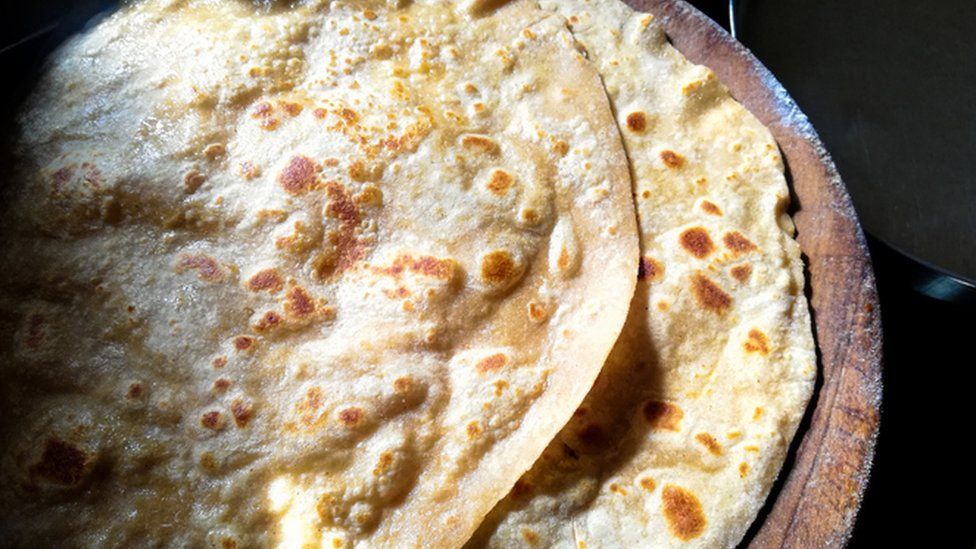
The women in the study were given chapatis to eat at home that contained a radioactive substance to act as a marker for iron absorption
By Susie Rack
BBC News, West Midlands
The daughter of a woman who participated in a radioactive chapati study says her mother believed she was getting help for arthritis.
In 1969, a group of South Asian women in Coventry were given chapatis containing a radioisotope.
The daughter, who wants to remain anonymous, said her mother’s GP recommended she participate.
“I know she thought that this was somehow connected to sorting out her knee problems,” she says.
Her mother, who died in 2000, moved to Foleshill, Coventry, from Punjab, in India in the early 1950s. She did not speak English or read or write, instead relying on her children to translate.
Despite two inquiries in the 1990s, the 1969 study has come under the spotlight again after concerns whether 21 research subjects had given informed consent.
Memories of the chapati study came “flooding back”, the daughter says, after recent media coverage.
“Chapatis were delivered to our house,” she says. “I was only 14 at the time. I didn’t really question it.
“Every time we sat down for dinner my mum would open up her packet of chapatis.”
Concerned families attended a meeting in Coventry in 1995 to discuss the study
Inquiries in the 1990s were sparked by a documentary featuring a participant who said she had not known about the radioactive substance.
The 1969 study was attempting to understand why so many people in the south Asian population suffer from anaemia, a lack of of iron.
By adding the radioactive iron to wheat before turning it into chapatis, it made it easier to track and measure the iron in participants’ bodies.
According to the Medical Research Council’s (MRC) 1998 inquiry, the study’s practices exceeded research standards at the time and the doses involved posed a “very small” risk to health.
The now disbanded Coventry Health authority stated in its 1995 inquiry report the levels of radioactivity were similar to chest x-rays at the time.
However, committee members also highlighted ethics and regulation regarding consent had since significantly moved on.
Although researchers said they visited participants to gain consent, a reliance on a health visitor and family members to translate made it possible “full details of the study were not grasped”, it concluded.
None of the research subjects came forward to give evidence to the inquiry.
Image source, Medical Research Council
The MRC inquiry, which published its findings in May 1998, was chaired by Rabbi Julia Neuberger
The daughter does not recall researchers visiting her home, but has vivid memories of accompanying her mother in a van with other Asian women to a testing facility, likely to have been Harwell, Oxfordshire.
“My mum wanted to take me to interpret. She didn’t really know what was happening,” she says.
“I remember when we got to this place it was heavily guarded. I’d never really seen people in uniform before. It was clinical looking… there was a lot of [medical equipment].”
The women were there for a full day, tested in individual rooms, while the daughter was asked to wait outside.
She describes discovering recent media reports as a “revelation”, which has led her to question her mother’s ill health after she died at 78 with diabetes, cancer and organ failure.
“My mum’s health just drastically went downhill. And yet we’ve got a good long history of longevity,” she said.
The MRC said it was liaising with Coventry MP Taiwo Owatemi, who has called for a fresh inquiry, and reiterated its commitment to the “highest standards of integrity” in research, openness and transparency.
Follow BBC West Midlands on Facebook, Twitter and Instagram. Send your story ideas to: newsonline.westmidlands@bbc.co.uk
Related Topics
Related Internet Links
The BBC is not responsible for the content of external sites.








